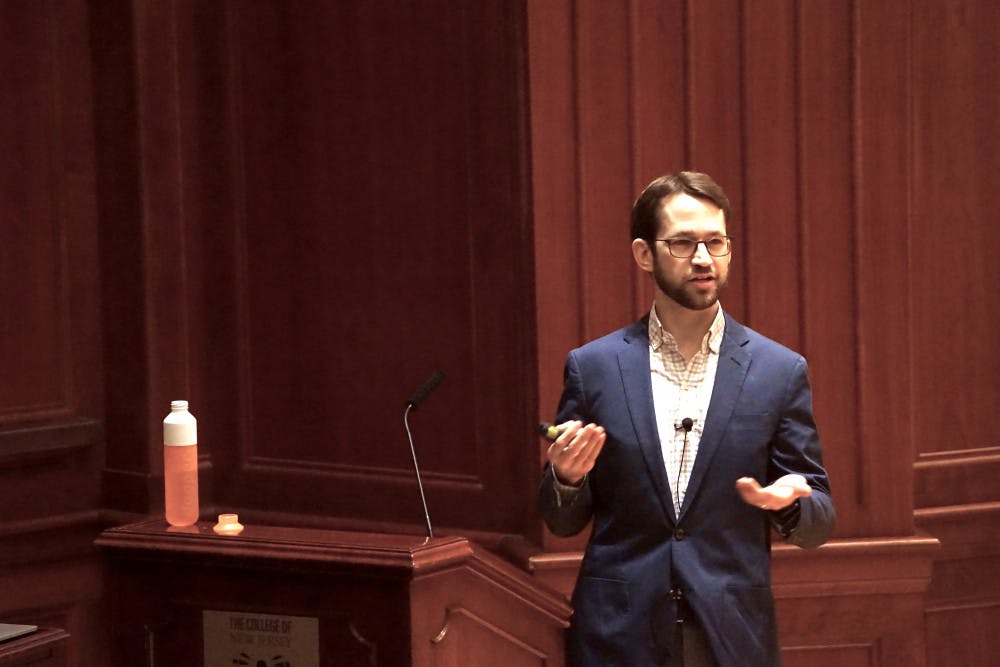By Miguel Gonzalez
News Editor
The School of Arts and Communication kicked off its fall 2018 faculty lecture series with a presentation titled “A Personal History of Game Design,” in Mayo Concert Hall on Friday, Sept. 14.
Josh Fishburn, an assistant professor in the interactive multimedia department, led the first faculty lecture by focusing on the perception of video games and their ultimate purpose.
Fishburn first introduced himself by explaining his previous experience as a professor at the University of Wisconsin-Whitewater and his interest in the audio and visual movement of video games.
Fishburn captured the audience’s attention when he explained how video games stimulate imagination.
“You can be as anonymous or authoritarian as your heart desires when you play a game,” he said.
Video games can range from action games such as Fortnite or Super Smash Bros, to imaginative games like Minecraft, according to Fishburn.

Fishburn then reminisced of his childhood, when he often played Teenage Mutant Ninja Turtles for the Nintendo Entertainment System with his brother. Fishburn praised the video game’s catchy soundtrack and vivid graphics.
“It was the first game I played where I felt like a cartoon,” he said.
Fishburn recalled the public outcry against the release of Mortal Kombat in 1992. In the game, players can beat up and kill off their opponents through fatality moves, which feature gory visuals of fighters ripping heads off, impaling chests and tossing defeated opponents onto a floor of spikes, according to Hardcore Gaming 101.
Despite criticism from parents and politicians about the game’s violent visuals, Fishburn admired the gaming experience.
“I wasn’t fixated on the visuals — I was fixated on the sounds,” Fishburn said. “It made me feel powerful as a kid. It was cool. I could defeat these really powerful characters.”
Fishburn explained his path to college and his admiration for unconventional video games. As a first generation college student, Fishburn claimed he once doubted the usefulness of his education until he enrolled at the University of Denver’s master’s program in emergent digital practices.
During his mentorship under game developer Rafael Fajardo, Fishburn realized how video games can be more than just entertainment. Fishburn noted how Fajardo’s two games, Crosser and La Migra, portrayed humanitarian and social issues.
“I find these games to be radical in the best sense of the word,” Fishburn said. “It challenges us to think about how we play games and in context, what are games meant for.”
According to Fishburn, in Crosser, the player is an immigrant whose goal is to cross the Rio Grande river in Texas. The player must avoid coming into contact with border patrol agents in order to win, according to Fishburn.
In contrast, in La Migra, the player is a border patrol agent who tries to arrest as many immigrants as possible at the Rio Grande river, according to Fishburn.
Evan Vallecilla, a freshman interactive multimedia major, was fascinated by Fishburn’s dedication to video games.
“I grew up playing lots of 2-D and 3-D games, especially fighting games like Mortal Kombat,” Vallecilla said. “I really enjoyed Fishburn’s lecture. As a IMM major, I want to do what Fishburn has done.”
Fishburn discussed how video games evolved to be tremendous experiences for 21st century players. He pointed out how Passage, a game made by Jason Rohrer that was released in 2007, gave consumers an eye-opening experience.
According to Fishburn, the player begins as a person who gets into a relationship that eventually transforms into a marriage. The couple then walks through mazes that portray stages of life until the couple dies of old age — all in a matter of five minutes. Fishburn found games like Passage to redefine the purpose of video games.
“Are video games art?” Fishburn asked the crowd. “Are they supposed to express things? With experiences like these, do we question that video games are supposed to be entertaining?”
Fishburn concluded his lecture by evaluating a video game that his mother adored. His mother used his Playstation 3 to play Flower, a video game developed by Thatgamecompany.
In Flower, the player plays as the wind by using the controllers’ thumbsticks. Using this mechanism, players can push flower pedals and explore numerous forests and gardens, according to Fishburn.
Despite his love of action games, Fishburn recognizes the importance of interactive games like Flower.
“I loved this game because it showed me that there are audiences for many types of experiences,” Fishburn said. “You have to know who those people are and what they value. My mom valued nature and the game spoke to her because she could push a flower petal around.”







